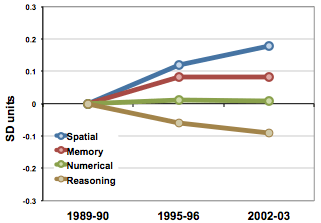In December 2007, Chris Condon and David Schroeder made a presentation titled Is the Flynn Effect Primarily a Rise in Spatial Ability? at the annual meeting of the International Society for Intelligence Research. They examined whether the Flynn effect, which is the steady rise in performance across time on IQ tests, is general across abilities or largely specific to spatial ability. The Flynn effect is important for the Foundation to examine because changes in performance over time on our tests affect test norms, for instance.

We formed an IQ-like index of general ability by summing scores on nine cognitive Foundation tests. The general ability index increased .07 standard-deviation (SD) units from 1989-90 to 2002-03, which confirms that there is a small Flynn effect on our tests. Four domain scores were also created for subgroups of our nine tests: Spatial, Memory, Numerical, and Reasoning.
The accompanying figure shows the changes in mean domain scores from 1989-90 to 2002-3. It is clear that the Spatial domain displayed the largest increase over time, .18 SD units, followed by a small increase for Memory, .08 SD units, a negligible gain for Numerical (.01), and a small decrease for Reasoning (-.09). This pattern was very similar across the two sexes and across various age ranges.
Following an examination of the four domains, we tested the hypothesis that the Flynn effect can be explained by an increase in spatial ability. We summed the seven non-spatial cognitive Foundation tests to create a non-spatial general ability index. This index increased only .01 SD units over 13 years. Therefore, the .07 SD unit increase for the general ability index is mostly eliminated when the spatial tests are not included in the index.
We hypothesize that spatial ability may be increasing due to a greater experience during the developmental years of visual presentation of information as evidenced by video games and hand-held devices. Condon and Schroeder presented a paper on these results at the annual meeting of the International Society for Intelligence research in 2007, based on the internal study.
















